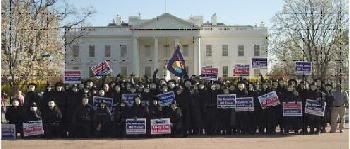Tax protester won't budge

By Mark LaFlamme, Staff Writer
Saturday, January 20, 2007
A day after he was convicted of evading taxes, Ed Brown of Plainfield, N.H., said he has no animosity toward the police who he said forced him to retreat inside his fortresslike home. But Brown also said he is nowhere near ready to surrender and warned that police who uphold unconstitutional laws may force the country into revolt.
Read more here.












1 Comments:
PATTERN CRIMINAL
JURY INSTRUCTIONS
_______________
Chapter 1.00
GENERAL PRINCIPLES
Committee Commentary 1.02
2005 Edition
The Committee made no change in the instruction.
A panel of the Sixth Circuit quoted paragraph (4) of this instruction and stated that it cured any confusing statements made by the district court during voir dire. United States v. Okeezie, 1993 WL 20997 at 4, 1993 U.S. App. LEXIS 1968 at 4 (6th Cir. 1993)(unpublished).
1991 Edition
The jurors have two main duties. First, they must determine from the evidence what the facts are. Second, they must take the law stated in the court's instructions, apply it to the facts and decide whether the facts prove the charge beyond a reasonable doubt. See Sparf v. United States, 156 U.S. 51, 102-107, 15 S.Ct. 273, 39 L.Ed. 343 (1895); Starr v. United States, 153 U.S. 614, 625, 14 S.Ct. 919, 923, 38 L.Ed. 841 (1894).
The jurors have the power to ignore the court's instructions and bring in a not guilty verdict contrary to the law and the facts. Horning v. District of Columbia, 254 U.S. 135, 138, 41 S.Ct. 53, 54, 65 L.Ed. 185 (1920).
But they should not be told by the court that they have this power.
United States v. Krzyske, 836 F.2d 1013, 1021 (6th Cir.), cert. denied, 488 U.S. 832, 109 S.Ct. 89, 102 L.Ed.2d 65 (1988); United States v. Avery, 717 F.2d 1020, 1027 (6th Cir.1983), cert. denied, 466 U.S. 905, 104 S.Ct. 1683, 80 L.Ed.2d 157 (1984); United States v. Burkhart, 501 F.2d 993, 996-997 (6th Cir.1974), cert. denied, 420 U.S. 946, 95 S.Ct. 1326, 43 L.Ed.2d 424 (1975).
They should instead be told that it is their duty to accept and apply the law as given to them by the court. United States v. Avery, supra at 1027.
Post a Comment
Subscribe to Post Comments [Atom]
<< Home